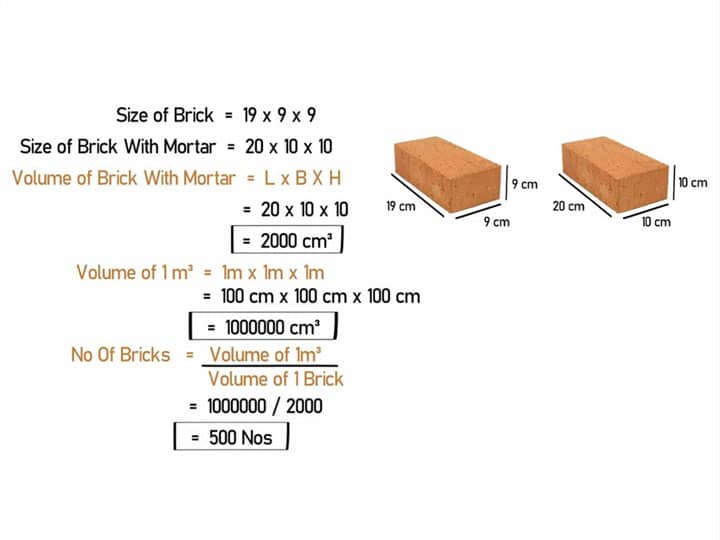On the off chance that you need to realize what number of bricks required per square meter or square feet, in this post we will talk about brick amount figuring. You can utilize this brick amount adding machine equation for your home or divider development.
The standard coordinating size for brickwork is 225 mm x 112.5 mm x 75 mm (length x depth x height). This incorporates 10 mm mortar joints, thus real size of a typical brick is 215 x 102.5 x 65 mm. There are assortments of bricks, for example, regular bricks, confronting bricks, building bricks, secluded, sovereign, enormous, conclusion, lord, normal, roman and utility bricks.
Standard elements of brick in metric units are 225 x 112.5 x 75 mm.
Duplicate these measurements to get the volume of a brick, 0.225 m x 0.1125 m x 0.075 m = 0.00189 cubic meter.
In one cubic meter, number of bricks will be (1/0.00189)=529.1 bricks.
10% of brickwork will be secured by mortar.
Deduct 10% bricks from the 529.1, you will get 529.1-52.91=476.20 bricks.
Include 5% wastage of bricks.
5% of 476.20 is 23.80 bricks.
Add 23.80 and 476.20 to get number of bricks in one cubic meter brickwork.
23.80+476.20=500 bricks.
The standard components of brick are 9-inch x 3-inch x 4.5 inch. Convert these measurements into feet.
Presently increase these measurements to get volume of a brick.
0.75 feet x 0.25 feet x 0.375 feet = 0.0703125 cubic feet.
Bricks required for 1 cubic feet brickwork will be (1/0.070) = 14.285 bricks
10% space of brickwork is secured by mortar.
Take away 10% bricks from 14.285, 14.285-1.4285=12.85 bricks.
Include 5% wastage of bricks.
5% of 12.85 is 0.64 bricks.
Add 0.64 and 12.85 to get number of bricks in 1 cubic feet, you get 0.64 + 12.85 =13.492 bricks or you can say that 13.5 bricks. As you realize that there are 13.5 bricks in 1 cubic foot. Therefore, in 100 cubic feet there will be 1350 bricks.
The standard bricks computation equation is composed underneath.
In Feet: Length of divider in feet x Height of divider in feet x Thickness of divider in feet x 13.5 = number of bricks
In meter: Length of divider in meter x Height of divider in meter x Thickness of divider in meter x 500 = number of bricks.
To compute bricks in a divider, you have to know measurements of the divider development. For instance, if a divider is 10 feet in length with 10 feet height and 9-inch thickness. At that point you can discover its bricks required for the development.
Different elements of divider. 10 feet x 10 feet x 0.75 feet. You will get 75 cubic feet. You have seen over that there are 13.5 bricks in 1 cubic feet brickwork. So, there will be 75 x 13.5 =1012.5 bricks in 75 cubic feet. In this strategy, you can compute bricks for any divider.
In another strategy we can compute what number of bricks in 1m3 of 4-inch brick divider and how to ascertain no of brick in 1m3 and 1m3 what number of bricks. We realize that bricks have unpredictable shape and size and their estimation fluctuate as indicated by various country yet in this subject we estimated by standard size of local brick that is measured size of brick utilized in standard computation.
What's more, in many meeting type and PSU tests there is one inquiry pose to what number of no of bricks are utilized in 1m3 (cubic meter) of 4-inch brick divider or 1m3 what number of bricks that is most significant inquiry question. The standard size of bricks here are measurement 190×90×90 mm in which length of brick is 190mm, width of brick is 90 mm and depth of brick is 90 mm.
Thickness of concrete mortar: in brickwork concrete mortar is utilized for sticky material and expanding their quality relies upon mortar thickness. Thickness of concrete mortar in brickwork is around 10 to 12 mm is being utilized.
In excess of 12 mm thickness of mortar concrete, decrease the quality of brick divider so it probably won't be utilized. So we ought to apply just concrete mortar thickness of 10 mm to 12 mm in brickwork. More than 10 to 12 mm and not as much as abatement the quality of brick divider.
In this count we need to discover no of bricks in 1m3 brickwork of 4 inch brick divider and 1m3 what number of bricks. We have the given data after estimation
Size of one brick=190 ×90 mm (as indicated by particular standard size)
Volume of brick divider =1m3
Thickness of concrete mortar=10mm
Steps of counting the number of bricks in 1m3
Going forward we ought to ascertain number of particular brick by partitioning brick divider volume 1 meter solid shape by volume of one measured size brick.
We need to include concrete mortar thickness that is 10 mm in every estimation of measured brick measurement.
Size of one brick with mortar
=190×90×90 mm
= (190+10) ×(90+10) ×(90+10) mm
Size of brick with mortar =200×100×100mm
And presently we convert mm into meter
Measured brick size with mortar=200×100×100mm
We realize that 1m=1000mm so we should isolate each measurement by 1000 we get
= (200/1000) × (100/1000) × (100/1000)
Size of brick with mortar = 0.2×0.1×0.1 m
Presently we compute volume of one measured brick with mortar
=0.2×0.1×0.1 m3=0.002m3
Volume of 1 brick with mortar = 0.002 m3
So, number of bricks
= volume of brick divider/volume of 1 brick with mortar
no of bricks in 1m3 = 1/0.002 = 500 no's
Presently question is what number of no of bricks are utilized in 1m3 of brickwork or 1m3 what number of bricks. Answer: 500 no of bricks are utilized in 1m3 (cubic meter) of brickwork of 4-inch brick divider.
